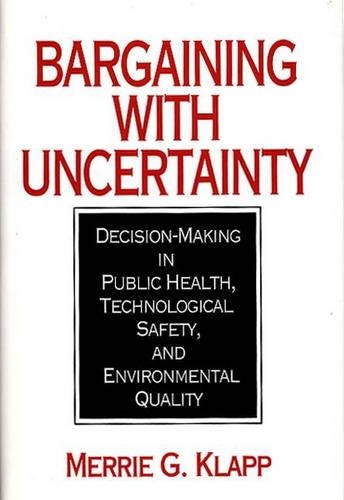
Bargaining With Uncertainty: Decision-Making in Public Health, Technologial Safety, and Environmental Quality
(Hardback)
Publishing Details
Bargaining With Uncertainty: Decision-Making in Public Health, Technologial Safety, and Environmental Quality
By (Author) Merrie G. Klapp
By (author) Sy D. Friedman
Bloomsbury Publishing PLC
Praeger Publishers Inc
27th January 1992
United States
Classifications
Tertiary Education
Non Fiction
Public health and safety law
Management and management techniques
Civil service and public sector
Health systems and services
347.3044
Physical Properties
Hardback
168
Description
In this volume, Klapp explains how regulatory decisions in such crucial areas as public health, technological safety and environmental quality are molded and recast. She finds that "scientific uncertainty" is a key factor, with agencies, interest groups, Congress, and the courts attempting to shift responsibility of proof or varying the standard of proof according to the pressures brought to bear on the issue. In general, Professor Klapp finds that when citizens or industrialists organize to protest a regulatory decision and when the legislature or the courts take scientific uncertainty into account, then the initial regulatory decision is changed. By contrast with the United States, where scientific uncertainty is used as a public resource and rationale for change, in France and Britain scientific uncertainty is treated as a private resource. French and British scientists do not treat regulatory decisions as opportunities to reveal scientific uncertainty to the public - instead, discussions of uncertainties are held behind "closed doors" and, when reports are made to the public about regulatory decisions, scientific information is presented as if it were certain.
Reviews
Klapp (urban studies, MIT) examines how scientific information and uncertainty contribute to or interfere with the formulation of regulatory policy in the areas of environment (dioxin exposure), technological safety (liquified natural gas), and public health (saccharin). In some cases uncertainty is invoked to strengthen regulations, in other cases to weaken or delay it. Contrasting the contribution of science to policy in Europe versus the US, Klapp focuses on transactions among government, citizens, industry, and ultimately the court system. Additional case studies include licensing of an herbicide, setting of occupational exposure standards, and siting of nuclear power plants. In each case scientific data and uncertainty play a role. Government is viewed as playing a dominant role in decision making, yet makes concessions to public interest to retain citizen cooperation. Agency bureaucrats want citizens to voluntarily accept health risks, and citizens accept a certain measure of risk to participate in the decision-making process.-Choice
"Klapp (urban studies, MIT) examines how scientific information and uncertainty contribute to or interfere with the formulation of regulatory policy in the areas of environment (dioxin exposure), technological safety (liquified natural gas), and public health (saccharin). In some cases uncertainty is invoked to strengthen regulations, in other cases to weaken or delay it. Contrasting the contribution of science to policy in Europe versus the US, Klapp focuses on transactions among government, citizens, industry, and ultimately the court system. Additional case studies include licensing of an herbicide, setting of occupational exposure standards, and siting of nuclear power plants. In each case scientific data and uncertainty play a role. Government is viewed as playing a dominant role in decision making, yet makes concessions to public interest to retain citizen cooperation. Agency bureaucrats want citizens to voluntarily accept health risks, and citizens accept a certain measure of risk to participate in the decision-making process."-Choice
Author Bio
MERRIE G. KLAPP is an Associate Professor with the Department of Urban Studies and Planning, Massachusetts Institute of Technology. A specialist in questions of political economy and environmental issues, her earlier works include the book The Sovereign Entrepreneur (1987) as well as articles in such journals as Environmental Professional and the Journal of Planning Education and Research.
